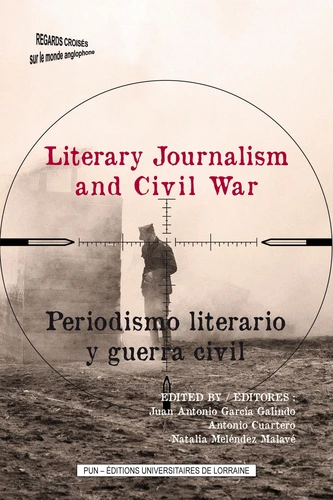Literary Journalism and Civil War. Reportage and Civil Wars through the Ages
Par : , ,Formats :
- Paiement en ligne :
- Livraison à domicile ou en point Mondial Relay indisponible
- Retrait Click and Collect en magasin gratuit
- Réservation en ligne avec paiement en magasin :
- Indisponible pour réserver et payer en magasin
- Nombre de pages230
- PrésentationBroché
- FormatGrand Format
- Poids0.43 kg
- Dimensions16,0 cm × 24,0 cm × 1,2 cm
- ISBN978-2-8143-0559-5
- EAN9782814305595
- Date de parution09/07/2020
- CollectionRegards croisés sur le monde a
- ÉditeurPresses Universitaires Nancy
Résumé
There are few events in human history that leave a wound as deep and as lasting as a civil war. Literary journalism has proven over time to be one of the best ways to address the moral ambivalence of reporting on these events. It is not enough to position yourself on one side or another because sometimes we do not even know who the enemy is. The reportage genre shows ways in which these questions can be answered, through a subjective and immersive style that accounts for all the faces of the conflict.
Throughout the 19th, 20th and 21th centuries, there have been numerous authors who used literary journalism to document these conflicts : Santiago Masferrer i Cantó, Manuel Chaves Nogales, Mário Neves, Peter Wellington Alexander, Martha Gellhorn, Hilde Marchant, Scott Anderson and Joe Sacco. The vision that these authors project shows the ability of literary journalism to portray the best and worst of human nature.
Throughout the 19th, 20th and 21th centuries, there have been numerous authors who used literary journalism to document these conflicts : Santiago Masferrer i Cantó, Manuel Chaves Nogales, Mário Neves, Peter Wellington Alexander, Martha Gellhorn, Hilde Marchant, Scott Anderson and Joe Sacco. The vision that these authors project shows the ability of literary journalism to portray the best and worst of human nature.
There are few events in human history that leave a wound as deep and as lasting as a civil war. Literary journalism has proven over time to be one of the best ways to address the moral ambivalence of reporting on these events. It is not enough to position yourself on one side or another because sometimes we do not even know who the enemy is. The reportage genre shows ways in which these questions can be answered, through a subjective and immersive style that accounts for all the faces of the conflict.
Throughout the 19th, 20th and 21th centuries, there have been numerous authors who used literary journalism to document these conflicts : Santiago Masferrer i Cantó, Manuel Chaves Nogales, Mário Neves, Peter Wellington Alexander, Martha Gellhorn, Hilde Marchant, Scott Anderson and Joe Sacco. The vision that these authors project shows the ability of literary journalism to portray the best and worst of human nature.
Throughout the 19th, 20th and 21th centuries, there have been numerous authors who used literary journalism to document these conflicts : Santiago Masferrer i Cantó, Manuel Chaves Nogales, Mário Neves, Peter Wellington Alexander, Martha Gellhorn, Hilde Marchant, Scott Anderson and Joe Sacco. The vision that these authors project shows the ability of literary journalism to portray the best and worst of human nature.


